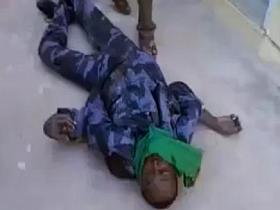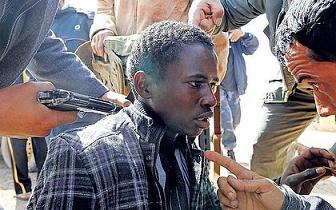Genocide: Pro U.S. rebels lynch Black Libyans
Further specific evidence has emerged that there is a strong racist element within the rebel forces, including at command level, and it is the stated intention of these forces to ethnically cleanse areas they capture of their dark-skinned inhabitants.
Racism amongst the rebels including at command level
In a recent article in the Wall Street Journal, journalist Sam Dagher pointed out the obvious fact that the Libyan war is aggravating ethnic tensions in that country. The article talks about the fate of Tawergha, a small town 25 miles to the south of Misrata, inhabited mostly by black Libyans, a legacy of its 19th-century origins as a transit town in the slave trade:
Ibrahim al-Halbous, a rebel commander leading the fight near Tawergha, says all remaining residents should leave once if his fighters capture the town. “They should pack up,” Mr. Halbous said. “Tawergha no longer exists, only Misrata.”
The myth of black mercenaries leads to lynchings
Other evidence of the massacres of black people, which include the lynchings and murder of black soldiers of the Libyan army, guest workers from other African countries and dark-skinned Libyan civilians include a report from the BBC on 25 February which cited a Turkish construction worker as saying:
“We had 70-80 people from Chad working for our company. They were cut dead with pruning shears and axes, attackers saying: ‘You are providing troops for Gaddafi.’ The Sudanese were also massacred. We saw it for ourselves.”
On 27th February Nick Meo of The Telegraph reported from Al-Bayda that he had been shown mobile phone footage of a ‘captured mercenary‘ (presumably he means black person with a uniform) lynched from a street lamp as well as a ‘black African hanging on a meat hook.’
Amnesty International crisis researcher, Donatella Rovera spent the period from 27 February to 29th May in Misrata, Benghasi, Ajabiya and Ras Lanouf. Yesterday she was interviewed by Austria’s ‘The Standard’ and had this to say on the subject:
“We examined this issue in depth and found no evidence. The rebels spread these rumours everywhere, which had terrible consequences for African guest workers: there was a systematic hunt for migrants, some were lynched and many arrested. Since then, even the rebels have admitted there were no mercenaries, almost all have been released and have returned to their countries of origin, as the investigations into them revealed nothing.”
Who spread the myth and why?
So what accounts for the widespread popularity of this myth? It is, to be frank, an example of highly successful propaganda, appealing to the basest of racial stereotypes. The myth was highly important in gaining consent for the operation in Libya, in order to cover up and justify the massacres of black people taking place.
In account after account, the mercenary myth is used to justify the imprisoning and killing of black people and this process continues today. Given the background of racial tension in Libya, including the October 2000 race riots which led to the killings of 200 people with 1000s forced to flee, the consequences of the spreading of this propaganda were entirely predictable and constitute incitement to commit atrocities.
The myth of black mercenaries was spread by certain political leaders including members of the National Transitional Council in Benghazi, British Defence Minister Liam Fox and NATO spokesperson Oana Longescu .
Read more?
internet site reference: http://humanrightsinvestigations.org/2011/07/07/libya-ethnic-cleansing/
Comments
There are 0 comments on this post















